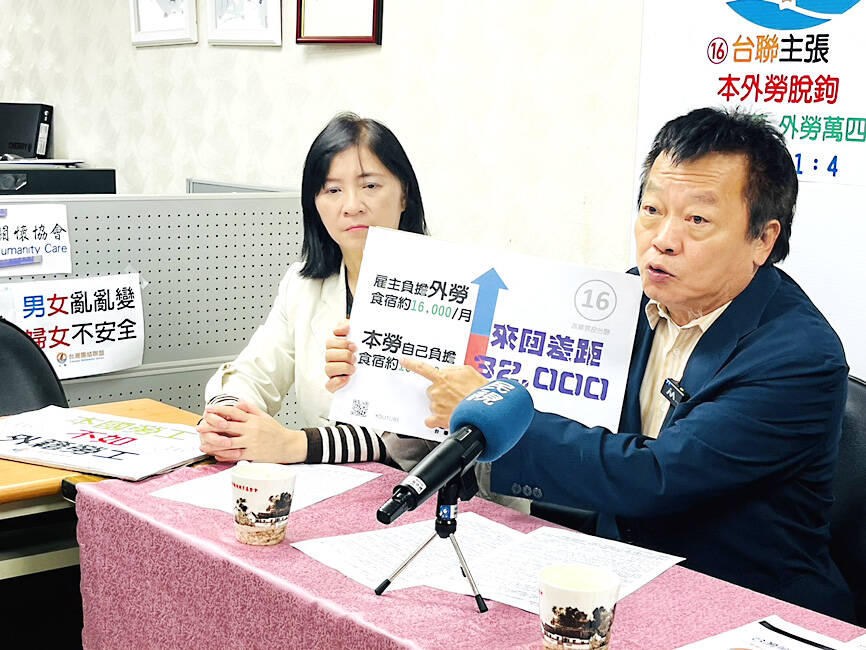Taiwanese should be paid more than foreign workers due to rising housing and living expenses, and it is time the government fixed its misguided minimum wage policy, the Taiwan Solidarity Union (TSU) and the owner of a human resources firm said yesterday.
The government’s policy “is the main cause of wage stagnation, as [it] actually works to exploit Taiwanese workers, while appeasing foreign workers with good pay and benefits,” TSU Chairman Liu Yi-te (劉一德) told a news conference at the union’s offices in Taipei.
“Wage parity is a foolish policy, and it is time to abolish it,” Liu said.

Photo: Chen Yu-fu, Taipei Times
On Monday next week, Taiwan’s monthly basic wage is to rise to NT$27,470 (US$ 882.15), an increase of 4.05 percent, he said.
“It is the eighth straight year that the government is increasing the minimum wage to the same figure for Taiwanese and migrant workers. Superficially, it looks like a benevolent measure to ensure fairness and equality among all workers, but in reality, it is a naive and misguided policy,” Liu said.
The two groups have different living conditions, he said.
“Taiwanese workers ... have additional living expenses, which at the bare minimum are NT$16,000 per month, so ... they are left with only one-third of the income of foreign workers,” Liu said.
Companies must provide accommodation and meals for foreign workers, which are deducted from their pay, but do not cost much, unlike the high housing and living expenses Taiwanese face, Liu said, adding that many foreigners also work overtime to earn more.
“Taiwanese workers are being abused by our government. This foolish policy has been in place for more than two decades. The Chinese Nationalist Party (KMT) and Democratic Progressive Party administrations chose to ignore the issue and sided with corporate interests while exploiting their own citizens,” he said.
For Taiwan to be competitive, Taiwanese must receive a minimum wage of about NT$40,000, while foreign workers should earn a basic wage of NT$14,000, Liu said.
Inflation eating into wages is seldom talked about, National Federation of Employment Service Association honorary chairman Huang Kao-chieh (黃杲傑) said.
Taiwan began importing foreign workers in 1991, and their monthly pay was NT$11,040, while Taiwanese college graduates were earning a minimum wage of just more than NT$20,000, he said.
“Now the minimum wage is rising to NT$27,470 next week, while Taiwanese college graduates working entry-level are earning just more than NT$30,000. So after 30 years, we have foreign workers earning three times what they were receiving in the 1990s, while Taiwanese workers only have 30 percent more pay,” Huang said.
Inflation has reduced the value of wages to levels seen in the 1990s, he added.
“Opening up to foreign workers has resulted in them becoming a vital source of labor, but it is also the main cause of Taiwan’s wage stagnation,” he said.
“Taiwan now has more than 700,000 foreign workers... It seems like a good policy to take care of foreigners, but someone has to speak up for the rights of the more than 10 million Taiwanese workers, who are not receiving benefits such as ... housing and meals,” he said.

Taipei has once again made it to the top 100 in Oxford Economics’ Global Cities Index 2025 report, moving up five places from last year to 60. The annual index, which was published last month, evaluated 1,000 of the most populated metropolises based on five indices — economics, human capital, quality of life, environment and governance. New York maintained its top spot this year, placing first in the economics index thanks to the strength of its vibrant financial industry and economic stability. Taipei ranked 263rd in economics, 44th in human capital, 15th in quality of life, 284th for environment and 75th in governance,

The Sports Administration yesterday demanded an apology from the national table tennis association for barring 17-year-old Yeh Yi-tian (葉伊恬) from competing in the upcoming World Table Tennis (WTT) United States Smash tournament in Las Vegas this July. The sports agency said in a statement that the Chinese Taipei Table Tennis Association (CTTTA) must explain to the public why it withdrew Yeh from the WTT tournament in Las Vegas. The sports agency said it contacted the association to express its disapproval of the decision-making process after receiving a complaint from Yeh’s coach, Chuang

Control Yuan Secretary-General Lee Chun-yi (李俊俋) tendered his resignation last night, admitting that he had misused a government vehicle, as reported by media. His resignation was immediately accepted by the Control Yuan. In a statement explaining why he had resigned, Lee apologized for using a Control Yuan vehicle to transport his dog to a pet grooming salon on May 20. The issue first came to light late last month, when TVBS News reported that Lee had instructed his driver to take the dog to the salon. The news channel broadcast photos that it said were taken by an unnamed whistle-blower, which purportedly showed the

A former officer in China’s People’s Liberation Army (PLA) who witnessed the aftermath of the 1989 Tiananmen Square massacre has warned that Taiwan could face a similar fate if China attempts to unify the country by force. Li Xiaoming (李曉明), who was deployed to Beijing as a junior officer during the crackdown, said Taiwanese people should study the massacre carefully, because it offers a glimpse of what Beijing is willing to do to suppress dissent. “What happened in Tiananmen Square could happen in Taiwan too,” Li told CNA in a May 22 interview, ahead of the massacre’s 36th anniversary. “If Taiwanese students or